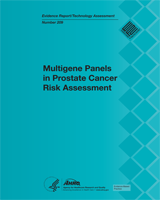NCBI Bookshelf. A service of the National Library of Medicine, National Institutes of Health.
Little J, Wilson B, Carter R, et al. Multigene Panels in Prostate Cancer Risk Assessment. Rockville (MD): Agency for Healthcare Research and Quality (US); 2012 Jul. (Evidence Reports/Technology Assessments, No. 209.)
This publication is provided for historical reference only and the information may be out of date.
The potential value of using single nucleotide polymorphism-based panels in prostate cancer risk assessment includes risk stratification, screening for undiagnosed disease, and assessing prognosis. We identified 15 single nucleotide polymorphism (SNP) panels that we considered fulfilled the definition of ‘close to commercially available’. They were widely variable in their makeup, containing 2-35 different SNPs, many combined with other risk factor data in predictive algorithms.
With regard to stratifying future risk and/or screening for current disease, a 5-SNP panel was evaluated in six articles. The other 14 panels were investigated in single studies only. Areas under the curve (AUCs) across all panels ranged between 58 and 74 percent. Thus, all of the panels had AUCs below 75 percent, the threshold below which tests are in general considered unlikely to be clinically useful. Moreover, within individual studies, the incremental gain in AUC observed when the predictive model including the SNP data was compared against the best alternative non-SNPs model (i.e., the absolute improvement in AUC) was very small.
Evaluations of the use of SNP-panels to distinguish between clinically important and latent/asymptomatic prostate cancer were available for four panels. None of the evaluations suggested that any of the four panels performed well in distinguishing between more and less aggressive disease. Prediction of prostate cancer mortality in affected men was evaluated for three panels. There was no association between risk alleles and prostate cancer mortality for any of the panels.
Not surprisingly, given that this field is in the early stages of development, no evidence was found which addressed the important questions of clinical utility. However, even if the review had identified more compelling evidence to support clinical, this would not in itself provide any direct evidence of the value of SNP-based test panels in reducing morbidity and mortality. Any benefit from improvements in prostate cancer risk prediction, screening, and prognostic stratification will depend to a large extent on clearer evidence that surveillance, diagnostic, and treatment strategies in themselves lead to reductions in morbidity and mortality.
- Conclusion - Multigene Panels in Prostate Cancer Risk AssessmentConclusion - Multigene Panels in Prostate Cancer Risk Assessment
Your browsing activity is empty.
Activity recording is turned off.
See more...
